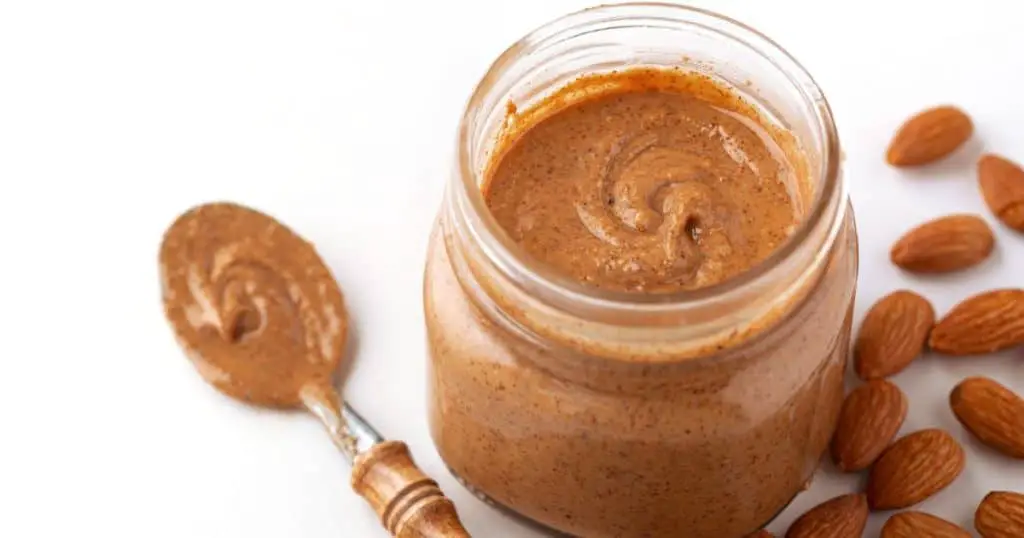What to Know
Can Dogs Eat Almond Butter?

Dogs are not just pets, but members of our families. As pet owners, we strive to provide our furry friends with the best possible care and nutrition. One of the questions that often comes up is whether dogs can eat almond butter. While some people may consider almond butter a healthy snack for humans, it’s important to understand whether it’s safe for our canine companions to consume.
There are varying opinions on whether dogs can eat almond butter, and it can be confusing for pet owners to navigate. Some sources claim that almond butter is safe for dogs in moderation, while others advise against feeding it altogether.
In this article, we’ll explore the topic of whether can dogs eat almond butter. including the benefits and risks, and provide you with the information you need to make an informed decision about whether to feed your dog almond butter.
Nutritional Value of Almond Butter for Dogs

Protein
Almond butter contains protein, which is essential for your dog’s growth and development. Protein helps to build and repair tissues, and it also plays a role in the production of hormones and enzymes. However, almond butter is not a complete source of protein for dogs, as it lacks some of the essential amino acids that dogs need to thrive. Therefore, it should not be the primary source of protein in your dog’s diet.
Fats
Almond butter is high in fat, which is an important source of energy for dogs. Fats also help to maintain healthy skin and coats, and they play a role in the absorption of certain vitamins. However, too much fat can lead to obesity and other health problems, so it’s important to feed almond butter to your dog in moderation.
Vitamins and Minerals
Almond butter contains several vitamins and minerals that are beneficial for your dog’s health. For example, it is a good source of vitamin E, which is an antioxidant that helps to protect cells from damage. Almond butter also contains magnesium, which is important for bone health, and riboflavin (vitamin B2), which helps to convert food into energy.
Here is a table summarizing the nutritional value of almond butter for dogs:
| Nutrient | Amount per 100g |
|---|---|
| Protein | 21g |
| Fat | 50g |
| Vitamin E | 24mg |
| Magnesium | 270mg |
| Riboflavin (vitamin B2) | 0.6mg |
Overall, almond butter can be a nutritious addition to your dog’s diet, as long as it is fed in moderation and as part of a balanced diet that meets all of your dog’s nutritional needs.
Benefits of Feeding Almond Butter to Dogs

Healthy Fats
Almond butter contains healthy fats that can help improve your dog’s coat and skin. These fats can also help your dog maintain a healthy weight and reduce the risk of heart disease.
Protein
Almond butter is a great source of protein, which is essential for your dog’s growth and development. Protein helps build and repair tissues, and it also plays a role in the production of enzymes and hormones.
Vitamins and Minerals
Almond butter contains a variety of vitamins and minerals that are important for your dog’s overall health. For example, almonds are a good source of vitamin E, magnesium, and riboflavin (aka vitamin B2).
Vitamin E is an antioxidant that can help protect your dog’s cells from damage. Magnesium is important for bone health and muscle function, and riboflavin is necessary for energy production and the metabolism of fats and proteins.
It’s important to note that while almond butter can provide some benefits to your dog, it should only be given in moderation. Too much almond butter can lead to weight gain and other health problems.
Additionally, some dogs may be allergic to almonds or other nuts, so it’s important to introduce almond butter slowly and watch for any signs of an allergic reaction, such as vomiting or diarrhea.
Risks of Feeding Almond Butter to Dogs

Allergies
Just like humans, dogs can have allergies too. Almond butter may contain ingredients that your dog is allergic to, such as peanuts or other nuts. It is important to check the label carefully before giving your dog almond butter. If your dog has a history of food allergies, it is best to avoid giving them almond butter altogether.
Choking Hazard
Almond butter can be a choking hazard for dogs, especially if they are given a large amount or if they try to eat it too quickly. To prevent choking, it is important to supervise your dog while they are eating almond butter and to give them small amounts at a time. You can also mix the almond butter with their regular food to slow down their eating and reduce the risk of choking.
Digestive Issues
Almond butter can cause digestive issues in dogs if they eat too much or if they have a sensitive stomach. Some dogs may experience vomiting, diarrhea, or other gastrointestinal problems after eating almond butter. To avoid these issues, it is important to only give your dog small amounts of almond butter and to monitor their reaction closely. If your dog experiences any digestive issues after eating almond butter, it is best to avoid giving it to them in the future.
How to Feed Almond Butter to Dogs

Serving Size
The amount of almond butter you can give to your dog depends on the size of your dog and their dietary needs. As a general rule, only 10% of your dog’s daily energy consumption should come from treats, including almond butter.
For smaller dogs, start with a small amount, such as half a teaspoon, and see how they react before increasing the serving size. For larger dogs, you can give up to a tablespoon of almond butter per day.
Preparation Tips
When feeding almond butter to your dog, make sure it is free from any harmful additives, such as xylitol, which can cause low blood sugar and liver damage.
Look for creamy, stir-free varieties made with roasted almonds and limited ingredients. Homemade almond butter is also a good option as you can control the ingredients and ensure it is safe for your dog.
Almond butter can be given to your dog as a treat or as an ingredient in homemade dog treats. When using almond butter in recipes, make sure to follow the serving size guidelines and adjust the recipe accordingly.
You can also mix almond butter with your dog’s regular food to add some flavor and nutrition to their diet.
Remember that almond butter should not be a substitute for your dog’s regular food. It should only be given as an occasional treat or supplement to their diet. If you have any concerns about feeding almond butter to your dog, consult with your veterinarian.
Before You Go
After researching and analyzing various sources, it is clear that dogs can eat almond butter in small quantities as an occasional treat. However, it is important to be cautious and check the ingredients before feeding them to your furry friend.
Almond butter is a good source of healthy fats, protein, and vitamins for dogs. However, it is high in calories and fat, so it should not be given in large quantities. Moreover, some almond butter products may contain harmful ingredients like xylitol or chocolate, which can be toxic to dogs.
If you want to give your dog almond butter, choose a natural and unsweetened brand that does not contain any harmful additives. Also, make sure to introduce it slowly and in small amounts to avoid any digestive upset or allergic reactions.
Overall, while almond butter can be a tasty and nutritious treat for dogs, it should not replace their regular meals or be given in excess. As with any new food, it is always best to consult with your veterinarian before introducing almond butter to your dog’s diet.

